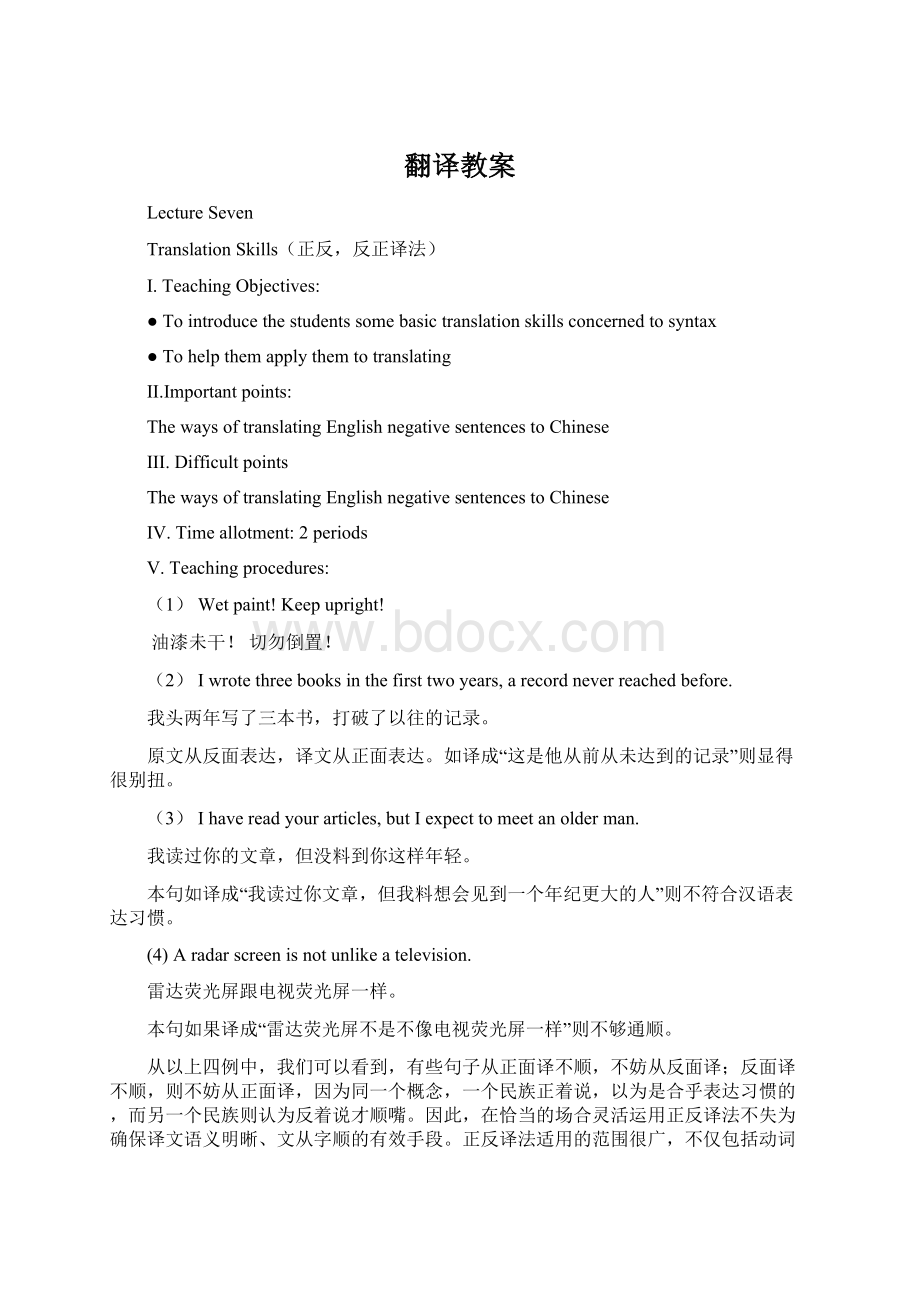翻译教案.docx
《翻译教案.docx》由会员分享,可在线阅读,更多相关《翻译教案.docx(12页珍藏版)》请在冰豆网上搜索。

翻译教案
LectureSeven
TranslationSkills(正反,反正译法)
I.TeachingObjectives:
●Tointroducethestudentssomebasictranslationskillsconcernedtosyntax
●Tohelpthemapplythemtotranslating
II.Importantpoints:
ThewaysoftranslatingEnglishnegativesentencestoChinese
III.Difficultpoints
ThewaysoftranslatingEnglishnegativesentencestoChinese
IV.Timeallotment:
2periods
Ⅴ.Teachingprocedures:
(1)Wetpaint!
Keepupright!
油漆未干!
切勿倒置!
(2)Iwrotethreebooksinthefirsttwoyears,arecordneverreachedbefore.
我头两年写了三本书,打破了以往的记录。
原文从反面表达,译文从正面表达。
如译成“这是他从前从未达到的记录”则显得很别扭。
(3)Ihavereadyourarticles,butIexpecttomeetanolderman.
我读过你的文章,但没料到你这样年轻。
本句如译成“我读过你文章,但我料想会见到一个年纪更大的人”则不符合汉语表达习惯。
(4)Aradarscreenisnotunlikeatelevision.
雷达荧光屏跟电视荧光屏一样。
本句如果译成“雷达荧光屏不是不像电视荧光屏一样”则不够通顺。
从以上四例中,我们可以看到,有些句子从正面译不顺,不妨从反面译;反面译不顺,则不妨从正面译,因为同一个概念,一个民族正着说,以为是合乎表达习惯的,而另一个民族则认为反着说才顺嘴。
因此,在恰当的场合灵活运用正反译法不失为确保译文语义明晰、文从字顺的有效手段。
正反译法适用的范围很广,不仅包括动词、名词、形容词、副词、介词、连词等不同词类,而且还包括一些词组或短语以及从句等。
下面分别予以举例说明。
(3)Iregrettolearnthatyouhavefailedintheexamination.
得知你未能通过考试,深表遗憾。
(4)Waterisagoodlubricant,ifyoucandeviseawaytokeepitfromleakingoutorevaporating.
如果能设法使水不漏出来或不蒸发掉,那么水就是一种很好的润滑剂。
(5)OnSundayJimidlesawayhistime.
星期天吉姆无所事事。
(3)Alackofawarenessofculturaldifferencesorlocalcustomscancreateproblems.
不注意文化差异或当地习俗可能会产生问题。
(4)Howcanmachinesworkintheabsenceofelectricity?
没有电时,机器如何运转?
(3)Theexplanationisprettythin.
这种解释理由很不充分。
(4)Itwouldbethemostdisastrousifevenarumorofitweregivenout.
甚至只要有一点风声泄露出去,其结果就不堪设想。
(5)Wormgear(涡轮)drivesarequietandvibrationfree.
涡轮传动没有噪音,没有震动。
(6)“Itwasthemostinfluentialprivategroup,”saysoneofthefoundermembers.
该组织的创始人之一说:
“这个组织曾是影响最大的非官方集团。
(3)Shemodelledbetweenroles.
她不演戏时当模特儿。
(4)Onlyoneofthemhasevergonetoliveinthecountryandhewasbackintownwithinsixmonths.
他们中只有一个真正在乡下生活过,不过这个人不到半年就返回了城里。
(4)Youcansafelysayso.
你这样说不错。
(5)Therelay(继电器)actedvainlyduetonegligiblecurrent.
电流太小,继电器不能启动。
(4)Wearyourcoatoryou’llcatchcold.
穿上大衣,不然你会着凉的。
(5)UnlessEnglandimprovetheirgame,they’regoingtolosethematch.
英格兰队如果不改进打法,就会输掉这场比赛。
正说与反说
(汉译英)
(1)她是外乡人。
Sheisastrangerhere.
Sheisnotanative.
(2)黄鼠狼给鸡拜年,不怀好心。
Theweaselgoestopayrespectstothehennotwiththebestofintentions.
Theweaselpaysacourtesyvisittothehenwithevilintent.
(3)我们决不辜负全国人民对我们的希望。
Wewillliveuptotheexpectationsofourpeople.
一、汉英两种语言的习惯用法不同
(1)油漆未干
Wetpaint.
(2)在他还没有来得及阻挡我之前,我已经跑出教室。
Beforehecouldstopme,Ihadrushedoutoftheclassroom.
(3)在收据尚未签字以前不得付款。
Beforethereceipthasbeensigned,themoneymustnotbepaid.
(4)如果没有他的帮助,我早就失败了。
Butforhishelp,Ishouldhavefailed.
(5)俗话说,‘男儿有泪不轻弹,皆因未到伤心处’嘛。
Asthesayinggoes,“Menonlyweepwhendeeplyhurt”.
Asthesayinggoes,“Menneverweepunlessanduntildeeplyhurt.”
二、为了加强语气以便获得较好的修辞效果
(1)我们讨论问题时,不能忘记这些基本观点。
Thesebasicconceptsmustbekeptinmindinourdiscussion.
三为了更加确切表达原文含义
(1)王同志这几年一直是全勤。
ComradeWanghasnevermissedaday’sworkforyears.
(2)正如没经历过大事的人一样,她是经不起成功也经不起失败的。
Likethoseoflittleexperience,shewaseasilyelatedbysuccessanddeflatedbyfailure.
(一)英语中含有否定语气的词语有:
1.动词:
Failmisslackignorerefusewithholdrefrain(from)neglect
Denyoverlookexclude
(1) 使我们失望的是他不顾大局。
Toourdisappointment,hefailedtotaketheoverallsituationintoaccount.
(2)他不愿接受那笔款子。
Herefusedtotakethemoney.
(3)他上火车站去接他的朋友,可是未能在人群中见到他。
Hewenttothestationtomeethisfriend,buthemissedhiminthecrowd.
(4)她看了看桌子上的点心,摇了摇头,一点也不吃。
Sheranhereyesovertherefreshmentsonthetablebutshookherheadandrefusedtotouchanything.
2.名词
Absencefailurerefusalignoranceneglectexclusion
(1) 他开车时心不在焉,几乎闯祸。
Hisabsenceofmindduringthedrivingnearlycausedanaccident.
(2) 我们完全不知道他的计划。
Weareincompleteignoranceofhisplan.
(3) 他未能履行诺言,我们大家都很失望。
Hisfailuretocarryouthispromisehasdisappointedeveryoneofus.
(1)这次演出根本没有失败,而是十分成功。
Theshowwasfarfrombeingafailure,itwasagreatsuccess.
(2)她的作文中几乎没有语法错误。
Therearefewgrammaticalmistakesinhiscomposition.
4.副词和副词短语
little
otherwise
too…to
(1) 他显然有不同的想法。
Heevidentlythinksotherwise.
3.形容词和形容词短语
Fewlittlefreefromfarfromsafefromshortof
(2) 她兴奋得说不出话来了。
Hewastooexcitedtospeak.
5.连词
Unlessbeforeuntil(rather)thanor
(1) 不了解这一点,就不能得到起码的知识。
Unlesswegraspthispointweshallneverbeabletoacquireevenelementaryknowledge.
(2) 她宁愿饿死,不愿行窃。
Shewilldieofhungerbeforeshesteals.
(3) 快一点,否则你就要迟到了。
Hurryup,oryou’llbelate.
6.介词和介词短语
Withoutaboveexceptbeyondinsteadofinplaceofoutof
(1)社会主义无疑比资本主义优越。
Socialismisbeyonddoubtsuperiortocapitalism.
(2)我要铅笔,不要钢笔。
Iwantapencilinsteadofapen.
(3)要不是你帮忙,那件任务我是无法按时完成的。
Withoutyourhelp,Icouldnothavefulfilledthetaskintime.
(二)英语中含有半否定语气的词有
Seldomhardlybarelyscarcelyrarely
(1)没有工作经验,出点差错,几乎是不可避免的。
Slipsarescarcelyavoidablewhenyou’renewtoyourwork.
(2)那些黑人挣到的钱几乎不够养家糊口。
TheNegroesbarelyearnenoughmoneytokeeptheirfamiliesalive.
(3)他太自私了,几乎谁也不喜欢他。
Hardlyanybodylikeshim,becauseheistooselfish.
(4)我最近不常见他。
Ihaveseenhimveryseldomrecently.
练习题
一、汉译英
1、日子很快过去了,她做工作却丝毫没有松懈。
2、他不在,我感到很寂寞。
1.Thedayspassedquickly,butsheworkedashardasever.
2.Inhisabsence,Ifeltverylonely.
3、我很高兴看见你安然无恙。
4、他不自然地咳了起来。
3.Iamgladtoseeyousafeandsound.
4.Hecoughedwithembarrassment.
5、你早晨来看我的时候,我还没有起床。
6、他只顾自己,不顾别人,使得大家都很生气。
7、他没有同伴,只一个人坐在车厢一角动也不动。
5.Whenyoucalledonmethismorning,Iwasstillinbed.
6.Hislackofconsiderationforthefeelingsofothersangeredeveryonepresent.
7.Travelingalone,hewassittingstillinthecornerofthecarriage.
LectureEight
TranslationSkills(被动结构的译法)
I.TeachingObjectives:
Tointroducethestudentssomebasictranslationskillsconcernedto
passivestructure
Tohelpthemapplythemtotranslating
II.Importantpoints:
ThewaysoftranslatingEnglishpassivestructuretoChinese
III.Difficultpoints
ThewaysoftranslatingEnglishpassivestructuretoChinese
IV.Timeallotment:
4periods
Ⅴ.Teachingprocedures:
• 一般被动语态有四种情况:
•第一,无从说出、无需提及主动者
•Whenwillthenewbridgebebuilt?
•什么时候建新桥?
•第二,出于某种考虑,无意说出主动者
•Generallyitisconsiderednotpolitetodoso.
•一般认为,这样做是不礼貌的。
•第三,强调动作的承受者
•Theroomwascleanedbyalittlegirl.
•房间是一个小女孩打扫的。
•第四,为了上下文的衔接和句子连贯
•Studentsaskedalotofquestions.Mostofthemhavebeensettledsatisfactorily.
•学生们问了好多问题。
大部分问题已经被圆满解决了。
•很多时候译成主动句式更好
•例如:
•Attentionhasbeenpaidtothenewmeasurestopreventcorrosion.
•已经注意到采取防腐新措施。
•一、译成中文的主动句
•
(1)保留原文主语
•翻译某些被动句时,如无需指出动作的发出者,动词的动作不带有受动色彩,通常可以按照原文语序顺译,原文的主语仍旧充当译文的主语。
•例:
visitorsarerequestednottotouchtheexhibition.
•观众请勿触摸展品。
•Watercanbechangedfromaliquidintoasolid.
•水能从液体变成固体。
•
(2)将原文主语译成宾语。
如果原文中没有施动者,必要时,可在译文中添加不确定的主语。
如:
“大家”、“人们”、“有人”等。
•Ifyouareaskedpersonalquestions,youneednotanswerthem.
•如果有人问你的私事,你可以不必回答。
•Saltisknowntohaveaverystrongcorrodingeffectonmetals.
•大家知道,盐对金属有很强的腐蚀作用。
•EnglishisconsideredveryimportantforChinesestudents.
•人们认为英语对中国学生来说是很重要的。
•IamafraidIshallbelaughedat.
•我怕大家笑话我。
•(3)把原文句中的一部分转译成主语
•英语中一些被动句译成中文时,需要将句子中某个适当的成分转译成主语。
既要做到不违背英文原文,又符合中文规范。
表示方位的地点状语转译成主语的情况较多
•例:
ThecompasswasinventedinChinafourthousandyearsago.
•中国在四千年前发明了指南针。
•Theanswerareprovidedinthenextchapter.
•下一章提供答案。
•有时原句中的宾语也可转译成主语
•MydaughterwasgivenapresentbyMr.Green.
•我女儿的一份礼物是格林先生给的。
•IwastoldthestorybymymotherwhenIwasyoung.
•这个故事是小时候妈妈讲给我的。
•(4)把施动者译成主语
•Wearekeptstrongandwellbyfreshair.
•清新的空气使我们身体健康。
•Thosetoweringpeaksareonlytobescaledbythemostdaring.
•只有最勇敢的人才能攀登那些高耸的山峰。
•Themagnificenthotelhadbeencompletelydestroyedbythebigfire.
•大火把这座富丽堂皇的宾馆完全烧毁了。
•(5)译成无主句
•英文原句中没有提到施动者时,有时可将被动句译成无主句。
•Theunpleasantnoisemustbeimmediatelyputanendto.
•必须立即中止这种讨厌的噪声。
•Veryoften,introductionsaremadeusingbothfirstandlastname.
•介绍的时候往往是连名带姓。
•Theuseofthesatellitemakesitpossibletoobservetheuniversemuchbetter.
•利用卫星,能够更好地观察宇宙。
•(6)译成带表语的主动句
•Theelementofheliumwasfirstfoundinthesun.
•氦元素最初是在太阳里发现的。
•ThecreditsysteminAmericawasfirstadoptedbyHarvardUniversityin1872.
•美国的学分制是1872年在哈佛大学首先实施的。
•Butthemarchcouldnotbestoppedwithbulletsnow.
•但这时候游行已经不是枪弹所能阻止得了的。
•ThefirstexplosiveintheworldwasmadeandusedinChina.
•世界上最早的炸药是在中国制造和使用的。
•以it做形式主语的被动语态巨型的习惯译法。
•以it做形式主语,被动语态的动词做谓语,再接that引导的主语从句的结构是英语中常见的一种句型。
在译成中文时,常要变成主动句。
有时不加主语,有时则要加一些泛指的不确定的主语,如“大家”、“人们”、“有人”等。
•不加主语:
•Itissaidthat据说
•Itissupposedthat据推测
•Ithasbeencalculatedthat据计算
•Itwasestimatedthat据估计
•Itmustbestressedthat必须强调
•Itwillbeseenfromthisthat应当指出
•Itcanbeclearlyseenthat
可以清楚地看到
•Itwassodecidedthat就此决定
•Ithasbeenprovedthat业已证明
•可加主语
•Itisadmittedthat大家承认
•Itisassertedthat有人主张
•Itisbelievedthat有人认为
•Itisfoundoutthat人们发现
•Itisknownthat众所周知
•Itisnotedthat人们注意到
•Itisthoughtthat有人认为
•Itistakenthat人们认为
•Itisgenerallyconsideredthat大家普遍认为
•Itisunderstoodthat人们明白
•二、译成中文的被动句
•有些英语被动结构不宜转译成汉语主动句式的,就可带着这些被动标记,译成被动句式。
•例如:
•Hehadbeenfiredforrefusingtoobeyorders.
•他因拒绝接受并令而被解雇了。
•Hewassetuponbytwomaskedmen.
•他遭到两个蒙面人的袭击。
•Ourforeignpolicyissupportedbythepeopleallovertheworld.
•我们的外交政策受到全世界人民的支持。
•ThesciencefictionhasbeentranslatedintoChinesebyafriendofmine.
•那部科幻